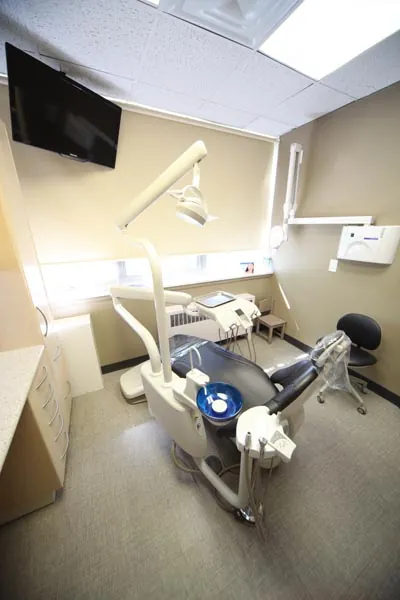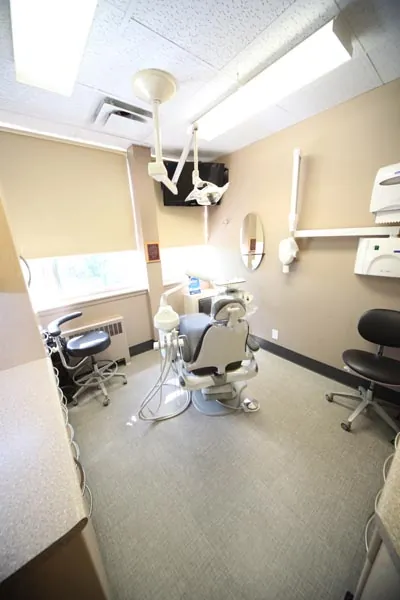Strathcona Dental Clinic offers Edmonton TMJ & TMD Therapy to alleviate your symptoms, protect your teeth, and help you achieve optimal oral health. If you are experiencing discomfort or pain in your jaw, noticing a popping or clicking sound restricts jaw movement when you open or close your mouth, or experiencing regular headaches or migraines, you might be dealing with temporomandibular joint (TMJ) dysfunction.
If you have been suffering from TMJ/TMD, our Edmonton dental office is here to help! We are pleased to offer Edmonton TMD treatment options to alleviate your pain and discomfort and help you attain optimal oral health.
What is TMJ?

What Are TMJ Disorders?
Temporomandibular disorders (TMD) refer to problems associated with jaw movement and pain in and around the jaw joints. The temporomandibular joint (TMJ) connects the lower jawbone to the skull on both sides of your head, and it controls the movement of the jaw, including sliding back and forth and opening and closing. In some people, the joint becomes overworked or stressed, which can lead to TMD. Bruxism, which is characterized by clenching or grinding of the teeth, is one common form of TMD.
What are the Causes of TMD?
Issues with the health or function of the TMJ can cause temporomandibular disorder (TMD). While the exact cause of TMD can be difficult to pinpoint, certain factors can lead to it, including:
- Bruxism, or the grinding and clenching of your teeth
- Facial trauma
- Misaligned teeth or jaw
- Poor dental work
- Osteoarthritis or rheumatoid arthritis
- Stress
What are the Symptoms of TMJ Disorder?
For most patients, TMD is rarely noticed immediately. This is because the symptoms of TMD come on gradually over time.
Common symptoms of TMD include:
- Jaw pain
- Facial pain
- Difficulty opening and closing your jaw
- Locking of the jaw
- Pain or difficulty chewing
- Popping, clicking, or a grinding sensation with jaw movement
- Frequent headaches
- Earaches
How is TMJ Diagnosed?
If you are experiencing any symptoms of TMD, you need to make an appointment with your dental professional. At Strathcona Dental Clinic, we will perform a complete, comprehensive evaluation – checking the alignment and condition of your teeth, evaluating your bite, and checking for areas of tenderness. If necessary, we will take a CBCT scan, which allows us to examine your facial bones and muscles.
What Treatments are Available for TMD
If our team determines you need treatment for TMD, the Strathcona Dental Clinic team will design a tailored treatment plan. There are several types of treatment options for TMD designed to help relieve the jaw pain, damage and uncomfortable symptoms associated with TMD. We will discuss your options with you and help you choose the best course of action based on the determined cause of your TMJ trouble and the associated symptoms.
Some of the most common treatment options for alleviating TMD symptoms are night guards and facial injections. In more advanced cases, referrals to TMJ specialists and/or orthodontists may be needed to re-align the teeth and bite or manage the symptoms. Typically, TMJ treatment at Strathcona Dental Clinic involves one of the following:
A Nightguard or Splint: You may be prescribed a nightguard or splint if you suffer from bruxism, thereby alleviating your TMD symptoms. A splint is a custom-made dental appliance that is worn to prevent clenching and grinding. The splint/night guard also helps to protect the teeth from the physical wear and tear resulting from the constant grinding of bruxism so that you bite against the night guard instead of wearing down your teeth.
Facial Injections: For some patients, a series of carefully placed facial injections may be prescribed to weaken the masseter muscles and reduce the stress placed on the jaw joint from bruxism.
Neuromodulators. Injecting a small amount of neuromodulator into the jaw can promote muscle relaxation and relief for the discomfort caused my TMJ or teeth grinding (bruxism). These injections do not affect facial appearance, jaw function, or speech; they are simply provided to help manage the effects of TMJ!
Why use Facial Injections to Treat TMJ?

Our facial injections take a non-surgical approach to treating TMD, specifically the grinding and clenching (bruxism) that can lead to discomfort and jaw damage. Clenching and grinding are commonly caused by stress, although they can result from certain medications, smoking, alcohol, or caffeine. During the daytime, you can often catch yourself and relax your muscles to release the clenching and/or stop the grinding. However, bruxism often takes place at night when you have no control. The grinding and clenching result in unnecessary stress, irrititation and inflammation in the jaw joint, contributing to TMD and the associated symptoms.
A series of injections into the jaw muscles can be a successful treatment option for alleviating symptoms of TMD, bt weakening and relaxing the muscles used when you grind or clench your teeth. We will administer a series of targeted injections, which weaken or relax the muscles that would otherwise cause clenching and grinding.
As a result, you place less stress on your jaw, and the tension decreases. TMJ injections at our Edmonton dental office can often lead to a significant decrease in symptoms of bruxism, with effects last many months and can even be permanent.
Added benefit? Facial injections for TMJ may help reduce the size of the muscle mass in the jaw, minimizing the appearance of a square shape of the jawline often associated with bruxism, restoring a more feminine jawline for patients who desire it!
Schedule Your Visit to Relieve Your TMJ Symptoms
At Strathcona Dental Clinic, we have the experience to help you deal with your TMD. Nightguards and Botox can be highly effective treatment options that allow you to get back to your normal life. If you are experiencing jaw pain, accompanied by other symptoms of TMD, contact us today for the relief you need!